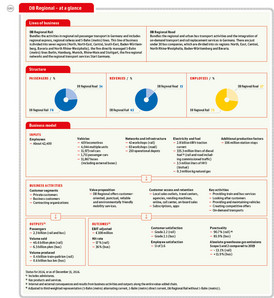Business model

The core service and the goal of DB Regional consist of bringing millions of passengers in regional transport to their desired destination safely, punctually, comfortably and in an environmentally friendly manner every day, while meeting the requirements of the respective transport contracts.
The core offer of DB Regional covers regional rail passenger transport with regional express, regional railway and S-Bahn (metro) lines as well as regional bus and urban bus transport services, intercity and express bus lines as well as charter and substitute transport buses.
These core products are supplemented by a portfolio of innovative forms of mobility such as on-demand transport. To attract new user groups through such modern local public transport services and achieve a high level of customer acceptance, continual integration of the individual elements is necessary on three levels: physical, digital and regarding tariffs.
Our vision for sustainable everyday mobility at DB Regional focuses on the intelligent linking of the entire mobility portfolio in local transport to create fully integrated mobility solutions in large-scale transport areas. For coverage of the first and last mile in rural areas on-demand services are particularly suitable and represent an efficient solution thanks to their flexible design, digital support and needs-oriented service. In close cooperation with our contracting organizations and implementation partner, the successive and long-term development and expansion of integrated transport concepts constitute a major concern for us.
With this holistic approach, DB Regional aims to provide comprehensive services to passengers not only in metropolitan regions and conurbations, but also to provide public mobility in rural areas as an alternative to private cars. The regional organizational structure should guarantee a modern local transport service that is geared towards requirements of contracting organizations and local customer needs.
As a rule, DB Regional provides its regional rail passenger transport services within the framework of the Regionalization Act as a public service and on behalf of the competent contracting organizations. In that respect, the contracting organizations are either the Federal states or state-owned companies or municipal special-purpose associations.
They conclude long-term transport contracts (with an average term of 10 to 15 years) in the framework of mostly competitively awarded tenders or grant corresponding route concessions to transport companies. These contracts determine the volume produced and set out detailed specifications for the quality of the services. By way of suitable transport concepts, high-quality mobility services and targeted capital expenditures in our vehicles as well as product development and digitalization, DB Regional intends to safeguard its leading market position and further strengthen its role as a quality and innovation leader in regional rail passenger transport.
Important performance figures are volume sold and volume produced, with transport contracts usually relating to volume produced. In addition to the concession fees, revenues from ticket sales are also an important source of income. Contracts in which fare proceeds remain directly with the contracting organization, while the transport company is fully compensated by the contracting organization for the entire range of services (gross contracts), are of increasing importance.
Predefined periods in transport contracts and route concessions, combined with the necessity of an extensive production system, result in a cost structure characterized by fixed costs. The key drivers are personnel, vehicle, maintenance, energy and infrastructure expenses. Only a small portion of expenses varies with the load factor of the trains.
In the rail sector, integrated services covering vehicle procurement, financing, fleet management, operation and maintenance were generally required by the contracting organizations in the past. There are also fragmented tender models. In the latter case, partial services and/or operation alone are put out to tender. In such models, other partial services remain with the public transport authorities (e.g. financing) or the vehicle suppliers (e.g. maintenance). In view of broad performance capability of DB Regional in all stages of the value chain, partial services can be tailored flexibly and in line with requirements, enabling DB Regional to successfully assert itself on the market as a provider of partial services and/or subcontractor of competitors.
Competition in the regional bus segment remains strong in the German bus market. The intensity of competition in this small-scale and regional market (about 400 contracting organizations) results from Europe-wide tenders and a licensing competition. In the case of tenders, volume sold is predominantly ordered in gross contracts with a term of eight to ten years. In urban transport, bus services are often awarded to municipal companies via in-house tenders, some of which are provided by regional transport companies via subcontracts.
The integration of scheduled and on-demand transport services offers the opportunity to render local transport more efficient in the future. This requires more functional tenders that focus more strongly on the customer-oriented design of transport services: smaller, often electric vehicles – especially on less busy routes and at off-peak times – operate according to actual demand and serve a dense network of lines on road and rail in a feeder logic. In this way, they enable a public door-to-door travel chain. DB Regional recognized this development at an early stage and, in collaboration with internal and external partners, it offers holistic solutions from the first to the last mile under the umbrella of DB Regional Road.